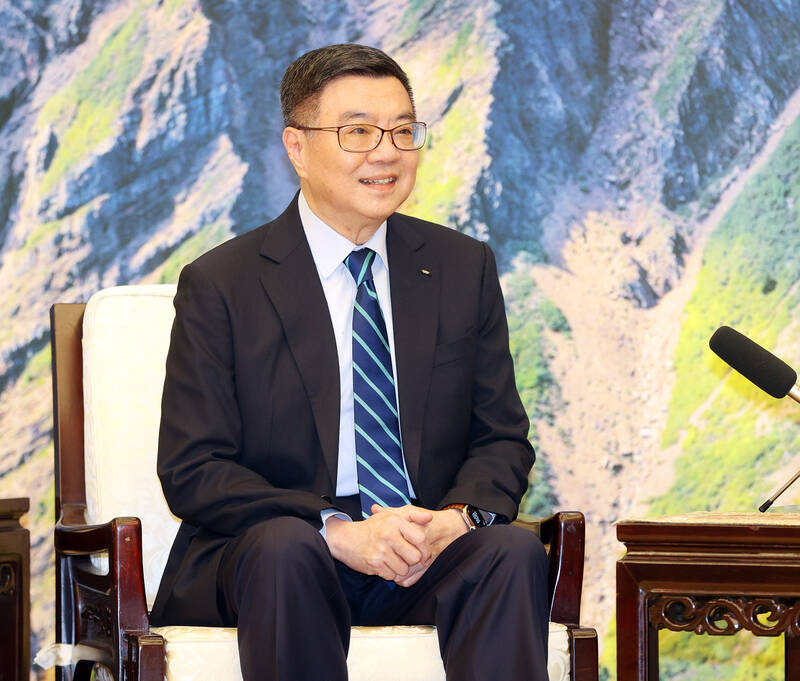Premier-designate Cho Jung-tai (卓榮泰) yesterday announced the latest list of deputy ministers who are to take office after the inauguration of president-elect William Lai (賴清德) on May 20.
The list, a mixture of old and new officials, ensures continuity, with officials who have performed well staying on while new blood is injected into the incoming administration, Cho said, adding that the new Cabinet would advance democracy, peace and prosperity.
Representative to France Francois Wu (吳志中) has been tapped to be a deputy foreign minister, joining incumbent Deputy Minister of Foreign Affairs Tien Chung-kwang (田中光).

Photo: Liu Hsin-de, Taipei Times
As an envoy, Wu is known for his initiative, making high-profile media appearances and bolstering bilateral cooperation with France in business and public health, Cho said.
Deputy ministers of national defense Hsu Yen-pu (徐衍璞) and Po Horng-huei (柏鴻輝) are to continue in their posts. Hsu was a former commander of the army, executive officer to the deputy chief of the general staff and commander of the Sixth Army Corps, while Po was a deputy executive officer of the Institute for National Defense and Security Research and air force chief of staff.
Former Democratic Progressive Party legislator Huang Shih-chieh (黃世杰) and National Security Bureau Deputy Director-General Hsu Hsi-hsiang (徐錫祥) are to be deputy ministers of justice.
Huang was on the Judiciary and Organic Laws and Statutes Committee and Internal Administration Committee during his stint as a lawmaker, while Hsu Hsi-hsiang had served as a prosecutor and head prosecutor at the Taichung District Prosecutors’ Office, head prosecutor at the Kinmen District Prosecutors’ Office and Changhua District Prosecutors’ Office, and head prosecutor at the High Prosecutors’ Office.
Ho Chin-tsang (何晉滄), director-general of the Small and Medium Enterprise Administration, is to be a deputy minister of economic affairs.
Ho will continue his work to sharpen the international competitiveness of Taiwanese small and medium-sized enterprises and advancing the government’s goal to cut carbon emissions, Cho said.
National Development Council Deputy Minister Kao Shien-quey (高仙桂) and Mainland Affairs Council Deputy Minister Liang Wen-chieh (梁文傑) have been retained, as well as Overseas Community Affairs Council Deputy Minister Ruan Jhao-syong (阮昭雄) and Veteran Affairs Council Deputy Minister Fu Cheng-cheng (傅正誠).
Ocean Affairs Council Vice Minister Wu Mei-hung (吳美紅) is to remain in her post, with the other vice ministerial post going to Ocean Conservation Administration Director-General Huang Hsiang-wen (黃向文).
Council of Indigenous Peoples Deputy Minister Qucung Qalavangan is to be joined by Land Administration Department Director Du Chang Mei-chuang (杜張梅莊).
National Palace Museum Director Hsiao Tsung-huang (蕭宗煌) and his deputy, Huang Yung-tai (黃永泰), have also been retained.
Meanwhile, former minister of health and welfare Chen Shih-chung (陳時中), Minister of Culture Shih Che (史哲), Taiwan Council for US Affairs Chairperson Yang Jen-ni (楊珍妮) and National Taiwan University professor of law Lin Ming-Hsin (林明昕) have been tapped to be ministers without portfolio.

A magnitude 5.6 earthquake struck off the coast of Yilan County at 12:37pm today, with clear shaking felt across much of northern Taiwan. There were no immediate reports of damage. The epicenter of the quake was 16.9km east-southeast of Yilan County Hall offshore at a depth of 66.8km, Central Weather Administration (CWA) data showed. The maximum intensity registered at a 4 in Yilan County’s Nanao Township (南澳) on Taiwan’s seven-tier scale. Other parts of Yilan, as well as certain areas of Hualien County, Taipei, New Taipei City, Taoyuan, Hsinchu County, Taichung and Miaoli County, recorded intensities of 3. Residents of Yilan County and Taipei received

Taiwan has secured another breakthrough in fruit exports, with jujubes, dragon fruit and lychees approved for shipment to the EU, the Ministry of Agriculture said yesterday. The Animal and Plant Health Inspection Agency on Thursday received formal notification of the approval from the EU, the ministry said, adding that the decision was expected to expand Taiwanese fruit producers’ access to high-end European markets. Taiwan exported 126 tonnes of lychees last year, valued at US$1.48 million, with Japan accounting for 102 tonnes. Other export destinations included New Zealand, Hong Kong, the US and Australia, ministry data showed. Jujube exports totaled 103 tonnes, valued at

BIG SPENDERS: Foreign investors bought the most Taiwan equities since 2005, signaling confidence that an AI boom would continue to benefit chipmakers Taiwan Semiconductor Manufacturing Co’s (TSMC, 台積電) market capitalization swelled to US$2 trillion for the first time following a 4.25 percent rally in its American depositary receipts (ADR) overnight, putting the world’s biggest contract chipmaker sixth on the list of the world’s biggest companies by market capitalization, just behind Amazon.com Inc. The site CompaniesMarketcap.com ranked TSMC ahead of Saudi Aramco and Meta Platforms Inc. The Taiwanese company’s ADRs on Tuesday surged to US$385.75 on the New York Stock Exchange, as strong demand for artificial intelligence (AI) applications led to chip supply constraints and boost revenue growth to record-breaking levels. Each TSMC ADR represents

TRUST: The KMT said it respected the US’ timing and considerations, and hoped it would continue to honor its commitments to helping Taiwan bolster its defenses and deterrence US President Donald Trump is delaying a multibillion-dollar arms sale to Taiwan to ensure his visit to Beijing is successful, a New York Times report said. The weapons sales package has stalled in the US Department of State, the report said, citing US officials it did not identify. The White House has told agencies not to push forward ahead of Trump’s meeting with Chinese President Xi Jinping (習近平), it said. The two last month held a phone call to discuss trade and geopolitical flashpoints ahead of the summit. Xi raised the Taiwan issue and urged the US to handle arms sales to